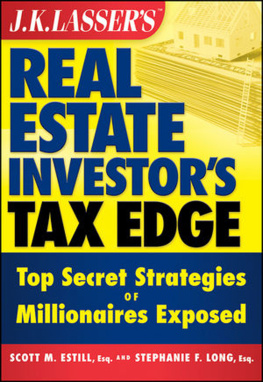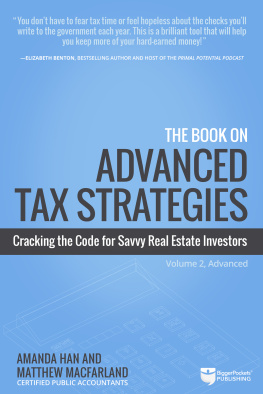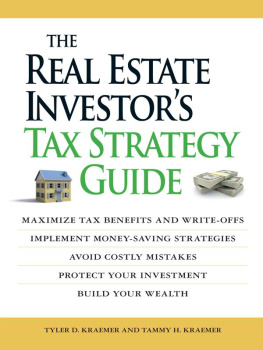J.K. LASSERS
REAL ESTATE INVESTORS TAX EDGE
J.K. LASSERS
REAL ESTATE INVESTORS TAX EDGE
Top Secret Strategies of Millionaires Exposed
Scott M. Estill, Esq.
Stephanie F. Long, Esq.

John Wiley & Sons, Inc.
Copyright 2010 by Scott M. Estill and Stephanie F. Long. All rights reserved.
Published by John Wiley & Sons, Inc., Hoboken, New Jersey.
No part of this publication may be reproduced, stored in a retrieval system, or transmitted in any form or by any means, electronic, mechanical, photocopying, recording, scanning, or otherwise, except as permitted under Section 107 or 108 of the 1976 United States Copyright Act, without either the prior written permission of the Publisher, or authorization through payment of the appropriate per-copy fee to the Copyright Clearance Center, Inc., 222 Rosewood Drive, Danvers, MA 01923, (978) 750-8400, fax (978) 646-8600, or on the web at www.copyright.com. Requests to the Publisher for permission should be addressed to the Permissions Department, John Wiley & Sons, Inc., 111 River Street, Hoboken, NJ 07030, (201) 748-6011, fax (201) 748-6008, or online at http://www.wiley.com/go/permissions.
Limit of Liability/Disclaimer of Warranty: While the publisher and author have used their best efforts in preparing this book, they make no representations or warranties with respect to the accuracy or completeness of the contents of this book and specifically disclaim any implied warranties of merchantability or fitness for a particular purpose. No warranty may be created or extended by sales representatives or written sales materials. The advice and strategies contained herein may not be suitable for your situation. You should consult with a professional where appropriate. Neither the publisher nor author shall be liable for any loss of profit or any other commercial damages, including but not limited to special, incidental, consequential, or other damages.
For general information on our other products and services or for technical support, please contact our Customer Care Department within the United States at (800) 762-2974, outside the United States at (317) 572-3993 or fax (317) 572-4002.
Wiley also publishes its books in a variety of electronic formats. Some content that appears in print may not be available in electronic books. For more information about Wiley products, visit our web site at www.wiley.com .
ISBN: 978-0-470-55805-8
Contents
Warning
T his publication is intended to provide accurate and authoritative information in regard to the subject matter covered. However, tax and legal information is constantly changing. Therefore, this book is sold with the understanding that neither the author nor the publisher is engaged in rendering legal, accounting, or other professional services to the reader. Your tax situation is unique, and if specific legal or other professional advice is needed, the services of a competent professional should be sought to assist you.
Introduction
W elcome and thank you for your interest in our real estate investor tax strategy guide. It is our sincere hope that you will find the information contained herein useful and applicable to your specific real estate ventures. We hope that by applying many of the strategies we outline in this book, you will be able to lower your overall tax bill to the legal minimum so that you pay only the correct amount of tax dueno more and no less.
This book is not intended to replace your accountant or other tax professional, since all taxpayers potentially have unique tax situations. Instead, this book is intended to supplement your knowledge of taxes and assist you and your tax professional in formulating appropriate tax strategies to reduce your overall tax bill. In addition, you should be aware that tax laws are constantly changing. This is especially the case today with our many challenges in declining real estate markets and the overall difficult financial environment. We expect President Obama and the Democratic Congress to make many changes to our current tax laws. We have already seen the beginning of these changes with the passage of the American Recovery and Reinvestment Act of 2009 (signed into law on February 17, 2009). Thus it is imperative that you work closely with your tax professional to make sure you are taking advantage of any new tax laws that may affect you and/or your real estate investments.
In each chapter of this book, you will find several examples that use everyday situations to help explain the complex tax rules. In Appendix A we also provide copies of many of the tax forms we discuss in the book. Finally, we strongly recommend that you obtain the IRS publications mentioned in this text. They are available on the Internet at www.irs.gov or in print. You can also contact the IRS at 1-800-829-3676 to obtain copies. Either way, these publications provide much valuable information and they are free of cost.
Where applicable, we have included references to sections of the Internal Revenue Code, court cases, IRS publications, IRS guidance via rulings, procedures, and letters, and other materials for you to review should you or your current tax professional need any additional information concerning the contents of our materials. We have also included some of our personal forms and checklists in Appendix B for your use.
Best of luck with your real estate ventures!
CHAPTER 1
Understanding Capital Gains
F or many real estate investors, the capital gains tax is the single greatest tax obligation on their personal tax returns. Individuals invest in real estate to make money, and many rely on the historical capital appreciation as the sole reason they invested in real estate to begin with. Therefore, limiting capital gains is a major priority when it comes to tax planning for real estate investors. This chapter discusses the major issues concerning capital assets and the tax treatment of any sales.
What Is a Capital Asset?
Gains and losses on the sale of assets must be categorized as either capital or ordinary gain or loss. The gain (or loss) on the sale of a capital asset results in special and sometimes favorable tax treatment. Capital assets are generally assets or property used for investment purposes or other property not specifically excepted from capital asset treatment. Investment property is property held for the production of income or anticipated appreciation in value, other than property used in your trade or business. Thus, rental property and any type of real estate that is held for investment purposes will be subject to capital treatment upon its sale or disposition. Dealer property, discussed in Chapter 5, is not investment property and does not receive capital treatment upon its sale or disposition.
For purposes of our discussion, a capital asset is not:
- Inventory or stock in trade.
- Property held by the taxpayer for sale to customers in the ordinary course of the taxpayers business (i.e., dealer property).
- Depreciable property used in a trade or business.
- Real property used in a trade or business.
- Copyrights and certain property created by the taxpayers own efforts.
- Accounts receivable or notes receivable.
Instead, a capital asset is:
- Property held for personal use, such as your home, auto, or furniture.
- Property held for investment or production of income, such as a rental property, a piece of raw land, or general real estate not held in the ordinary course of your trade or business.











